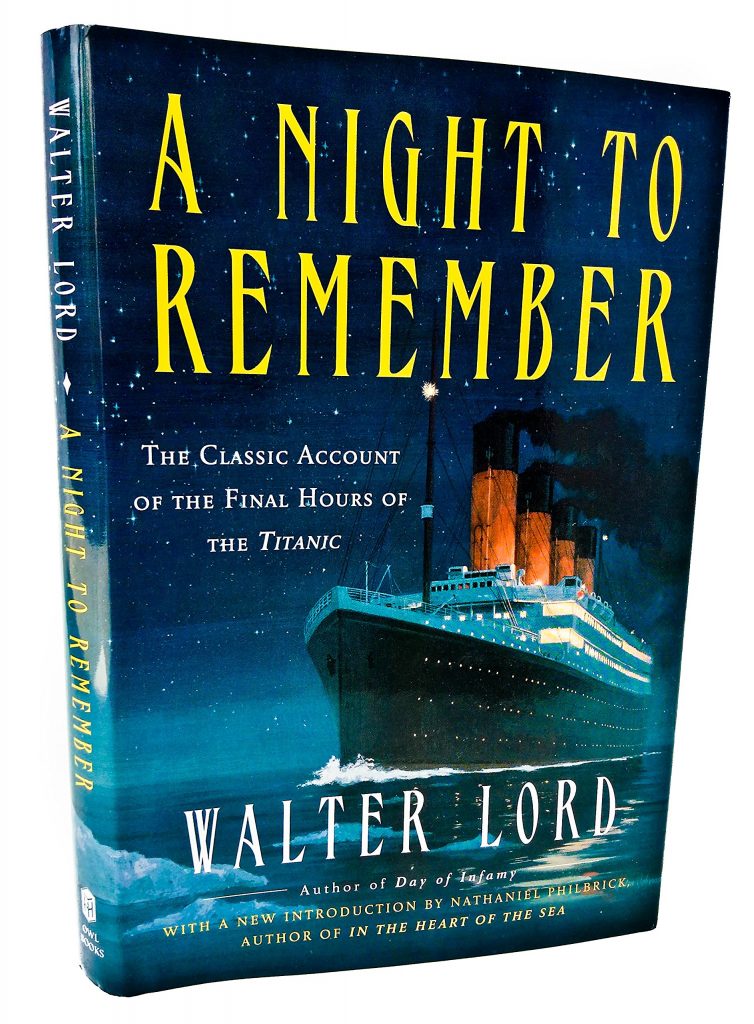On Sunday, 19th May, 2002, the acclaimed author, historian and Titanic enthusiast Walter Lord passed away. He’d contracted Parkinson’s Disease, and although his death didn’t really come as a shock to many, the wave of affection that swept around the world in the hours and days and weeks soon after he died showed just how revered Walter Lord was, and still is.
Through his highly-acclaimed works, A Night To Remember and The Night Lives On, Lord turned people on to Titanic , it’s that simple.
This touching obituary appeared on the alt.history.ocean-liners.titanic newsgroup, and its writer, Eric Seright-Payne, very kindly agreed to allow Titanic-Titanic.com to re-publish it for posterity, which is what you see now.

¨If it weren’t for his mother, we wouldn’t have alt.history.ocean-liners.titanic today.
I guess everyone’s heard by now. Sunday night, Walter’s battle against Parkinson’s Disease ended, in the only way it could. Some of us – myself included – had hoped some new, fast, inroads could be found into battling Parkinson’s, once Parkinson’s Disease started getting the federal funding attention it always deserved, but ultimately I knew any new protocols developed would not be beneficial to Walter, simply due to his advanced age and the long-term effects Parkinson’s had wreaked on his mind and body. I just didn’t want to accept that.
But like I said, if it weren’t for his mother, there wouldn’t be an alt.history.ocean-liners.titanic today.
Walter’s mother – while not in the social class of a John Jacob Astor – was a regular traveller on the Olympic; she had even met Captain Edward John Smith on several voyages. The day after Walter’s father proposed to her, and before she accepted that proposal, she sailed aboard the Olympic to ¨think things through.¨ On the voyage, she made her decision; when she debarked in England, she immediately booked passage back to New York where she accepted the proposal of marriage.
There’s a symmetry here I love: Without Walter Lord, the Titanic may simply have become another ¨ship lost at sea¨ story. Without the Olympic-class liners, Walter Lord may never have existed.
When Walter was born, his mother’s bedtime stories often focused on transatlantic liners and voyages; so much so that at the age of 9, his interest in Titanic’s story had already become his greatest interest.
Walter talked his mother into taking him on a transatlantic crossing. The ship chosen was the Olympic; according to Walter, he pestered every crewman he could about what happened, where, on that 1912 night. The majority of the crew found this little boy endearing; this child who was already so familiar with that night to remember that he could lead crewman to spots onboard Olympic and retell stories about the events that occurred on her sister ship fourteen years previously.
His love for the people of Titanic never left him. We all know how that love manifested itself in the 1950s, and I firmly believe the love of the subject matter shines through on every page of A Night to Remember. I firmly believe that love is what has kept A Night To Remember in print, continuously, for 57 years, and that love transcends literary styles. In 1955, in the initial hardback release, A Night to Remember was a New York Times bestseller. In 1999, following the release of James Cameron’s film, without a single word or sentence being modified, A Night To Remember again entered the best-seller’s list, over 40 years later.
Since the publication of A Night To Remember, I don’t think there’s been a Titanic project in which Walter hadn’t been involved; he was simply the man you went to. The producers of the television movie SOS Titanic relied upon him, heavily. Clive Cussler turned to Walter for information when writing Raise the Titanic!. For decades, every April 15th, Walter would be the guest of some late-night radio call-in show. He opened his door to both James Cameron and Dan Butler.
Walter and I were both advisers to a video-game called: Titanic: Adventure out of Time; that’s when the two of us met. I can remember asking him, at the time, how he could not be upset when people pushed information as historical fact, which they knew to be untrue. His answer?
In his gentlemanly way – and above all, Walter was always a gentleman; he’d tell stories of Titaniacs simply showing up at his door in New York, and his always taking a few moments to talk with them – he would say: ¨What’s being said about (the Titanic) isn’t as important as her story being out there. People who have an interest will learn the truth, anyway.¨ He was right, of course.
Walter was a brilliant historian and a wonderful writer; and again, his life had another symmetry with Titanic: his first and last published books, in his own, unique, style. Though some had been toying with ¨journalistic style¨ in writing of historical matters, Walter’s writing of A Night To Remember got it right.
His blend of journalism, along with cinematic style in revealing history, was a talent much copied, but seldom achieved. And I think that’s because of the love Walter had for his subject matter. Be it the Alamo, or Dunkirk, or Pearl Harbour, or the Titanic, Walter took his readers one step further because Walter, himself, wanted to know just that little bit more.
We’ve lost Walter. I’m going to miss him. But, in a very real way, we can never lose him. His works stand for themselves, and opening the cover of any of his books brings Walter, himself, right back to us.¨
Eric Seright-Payne
Livermore, California

